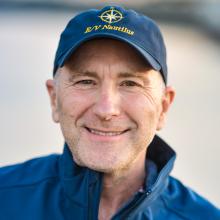
Greg Rouse
Tell us about your work/research. What kinds of things do you do?
I study the biodiversity of animals in the ocean. This involves documenting species distributions and their evolutionary relationships using morphology and DNA. Since I work on invertebrates such as annelids and echinoderms, and in the deep sea, this means many new species are discovered.
What sparked your initial interest in your career?
Seeing a coral reef via snorkel for the first time is a resonant memory. I also had the luck of a full-year undergraduate lecture/lab class on invertebrates that led me to really appreciate their diversity.
Who influenced you or encouraged you the most?
My Dad was in the Navy and going on the water regularly with him led to my fascination with our marine realm.
What element of your work/study do you think is the most fascinating?
Finding new species, naming them, and placing them on evolutionary trees. This then leads to many other inferences about biogeography and morphology and provides essential data for ecologists.
What are your degrees and certifications?
B.Sc. Zoology- University of Queensland 1983; M.Sc.- University of Queensland 1987; Ph.D.- University of Sydney 1991
What are your hobbies?
Photography, vegan cooking
What advice would you give someone who wants to have a career like yours?
Do a broadly-based science degree; math, especially statistics and chemistry will serve you well later. Get experience in the various aspects of marine biology and see if you like it. Not everyone likes fieldwork, or lab work, or writing. You need to find out what works for you and adjust your goals accordingly. Try and work in different labs and see how they function. Get to be an author or ideally lead a paper as soon as you can.
Expeditions
Greg participated in the following Ocean Exploration Trust expeditions:
